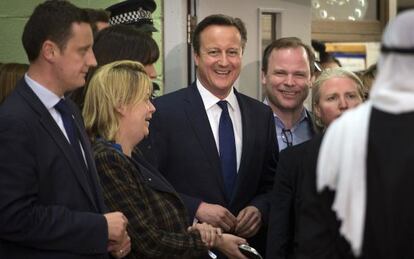David Cameron’s Conservatives win UK elections with absolute majority
Tory party takes 331 seats, enough to allow it to govern alone Scottish nationalists sweep 56 out of 59 seats in Scotland Labour, Liberal Democrat and UKIP leaders all hand in their resignations

UK Prime Minister David Cameron and his Conservative Party swept to victory in the general election held on Thursday with an absolute majority that nobody had been expecting.
The Tories took a total of 331 seats, five more than required to govern alone in Parliament, a possibility that none of the pre-election polls had contemplated in the days prior to the vote.
The results triggered the resignations of the leaders of the three biggest losing parties: Labour’s Ed Miliband, the Liberal Democrats’ Nick Clegg and Nigel Farage of UKIP.
The Labour Party was practically wiped off the electoral map in Scotland
Labour were practically wiped off the map in Scotland, losing 26 seats on a night that Miliband described as “difficult and disappointing.” “Britain needs a strong Labour party [... ] and now it’s time for someone else to take forward the leadership of this party,” Miliband said after announcing his resignation, which will come into effect this afternoon.
Labour’s dismal showing was only exceeded by Nick Clegg’s Liberal Democrats, which held only eight of the 57 seats they secured in 2010. The size of the defeat led the deputy prime minister to announce his resignation as party leader. “This is a very dark hour for our party but we cannot and we will not allow liberal values to be extinguished overnight,” he said.
Both parties have also lost some of their leading MPs. Labour’s Shadow Chancellor Ed Balls lost his seat, and so did Scottish Labour leader Jim Murphy and Shadow Foreign Secretary Douglas Alexander, who was also Labour’s election campaign chief.
The Lib Dems also lost three members of the current coalition government – Vince Cable, Danny Alexander and Ed Davey – as well as former party leader Charles Kennedy.
The other major development of the night, which the media are reporting as the biggest election surprise since 1945, was the overwhelming victory of the Scottish National Party (SNP) and its leader, Nicola Sturgeon. After Thursday, Scotland is practically a one-party region after the SNP obtained 56 of the 59 Scottish seats, with just one going to Labour – which until now had been the majority party.
This is a very dark hour for our party but we cannot and we will not allow liberal values to be extinguished overnight” Lib Dem leader Nick Clegg announces his resignation
“We knew we were going to do well,” said Sturgeon. “But never in my wildest dreams would I have imagined we’d win 56 out of Scotland's 59 MPs.”
The result means that the UK will hold a referendum on its EU permanence before the end of 2017, as promised by the prime minister. Cameron will now have to handle the pressure from the more Europhobic wing of his party if he wants the country to remain part of the EU.
The right-wing, populist and Europhobe party UKIP only obtained one seat even though it may end up being the third most-voted party overall, and second in nearly 90 constituencies. Leader Nigel Farage lost his South Thanet seat to the conservatives and announced his resignation as head of the party.
Cameron will also have to deal with the pro-independence pressure from Scotland, which voted to remain a part of Britain in September of last year yet has now fully embraced the secessionist party.
Sturgeon told the BBC that Thursday’s results do not constitute the “significant change” necessary to hold another independence referendum.
Never in my wildest dreams would I have imagined we’d win 56 out of Scotland’s 59 MPs” Scottish National Party leader Nicola Sturgeon
Chancellor of the Exchequer George Osborne said people should respect the result in Scotland and make the Scottish feel part of a strong United Kingdom.
Speaking in his Oxfordshire constituency, David Cameron promised that he would not let anybody down and would work to keep the country united.
Tu suscripción se está usando en otro dispositivo
¿Quieres añadir otro usuario a tu suscripción?
Si continúas leyendo en este dispositivo, no se podrá leer en el otro.
FlechaTu suscripción se está usando en otro dispositivo y solo puedes acceder a EL PAÍS desde un dispositivo a la vez.
Si quieres compartir tu cuenta, cambia tu suscripción a la modalidad Premium, así podrás añadir otro usuario. Cada uno accederá con su propia cuenta de email, lo que os permitirá personalizar vuestra experiencia en EL PAÍS.
¿Tienes una suscripción de empresa? Accede aquí para contratar más cuentas.
En el caso de no saber quién está usando tu cuenta, te recomendamos cambiar tu contraseña aquí.
Si decides continuar compartiendo tu cuenta, este mensaje se mostrará en tu dispositivo y en el de la otra persona que está usando tu cuenta de forma indefinida, afectando a tu experiencia de lectura. Puedes consultar aquí los términos y condiciones de la suscripción digital.









































